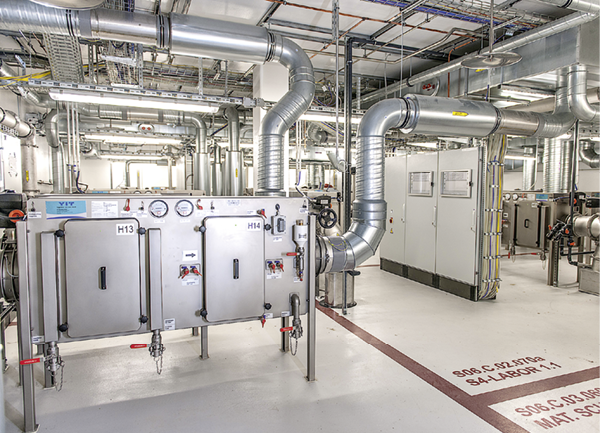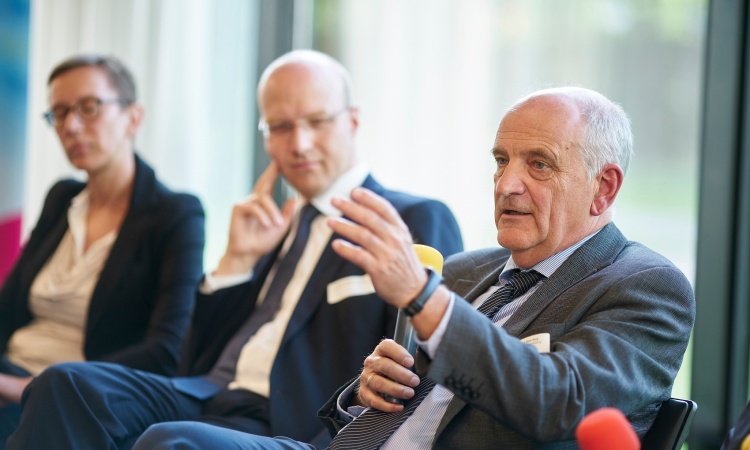Politics
The S4 laboratory
Health always has a political dimension, as seen at two recent international events - the World Health Summit in Geneva in May and the G7 Summit in the Bavarian Alps near Garmisch at the beginning of June.
Report: Anja Behringer

In Geneva, German Chancellor Angela Merkel canvassed for reforms in the World Health Organisation (WHO) and for a global disaster management plan amongst the representatives of the 194 WHO member states, alleging that mistakes were made in the management of the Ebola outbreak in West Africa and that reaction and actions were too hesitant. This insight obviously comes too late, but there is hope that future disasters will be managed in a better way. As the pathogens spread worldwide they should be fought on a global level.
Presently, Germany, which holds the current presidency amongst the seven most important developed nations (G7), wants to address the topic at the June summit. The development of new antibiotics, diagnostic tests and alternative methods of treatment are also to be promoted. This is a longstanding postulation as the German Law on Infection Prevention and Control was revised four years ago and the German federal states passed new directives for infection prevention and control in hospitals and tightened existing regulations.
Reaching security level 4
However, the federal German government now has another ace up its sleeve: the high security laboratory at the Robert-Koch-Institute (RKI) at the Virchow Clinic of Charité University Hospital in Berlin, which opened in February and has security level 4. This is the only federal medical institute with an S4-laboratory.
This facility will allow safe research into the most risky pathogens, such as Ebola, Marburg and Lassa viruses, along with the Crimean-Congo haemorrhagic fever virus that occurs in Greece. The lab has its own air, electricity and water supply, and multi-level security systems prevent the escape of pathogens.
The RKI is a regional WHO reference laboratory for polio, measles and mumps and, as a central facility for infection prevention in Germany, carries out numerous diagnostic and experimental procedures. Imported, highly contagious diseases call for a fast diagnosis so that quarantine and treatment options can be decided.
Furthermore, the lab also enables scientists to research highly pathogenic bacteria and combat them. Laboratory capacities are also made available to external scientists and for training. (The installation of mirrors also facilitates effective training.) The laboratory’s location close to the Charité isolation ward is also ideal.
Before the S4-laboratory can be used, all security measures, functions and processes must be checked as to their effectiveness and reliability in a long test phase, without the presence of pathogens. No complications are anticipated during this phase; thus the laboratory should be ready at the beginning of 2016.
Working safely with life-threatening pathogens in an S4-laboratory without endangering staff and the general public means the building must be separate from surrounding buildings both spatially and organisationally. Electricity supply and ventilation system are independent and are safeguarded against technical outages. Access to the high security laboratory is only possible for qualified experts in safe, full body protective suits with external air supply and takes place in the same way as exiting the laboratory, i.e. after disinfection in a special shower via several air locks.
All materials used, specifically wastewater and laboratory waste, are deactivated, which means the complete destruction of all possibly remaining viruses. Incoming and outgoing air is sterilised through a multi-level HEPA filter system. These measures have proved effective in other, comparable high security laboratories over the decades.
International Licensing Bodies have discussed whether pathogens should be grouped into higher biosafety levels, especially those pathogens where worldwide eradication is within reach, such as polio. Over the last few years a number of new viruses, such as SARS, MERS-CoV (Middle East Respiratory Syndrome Coronavirus) and also new types of influenza viruses have been detected that, according to the WHO, can also develop into a global health threat. These viruses include viruses in the highest risk level four, such as the Lujo virus in 2009 or the Hendra virus and the Nipah virus, which were detected in the 1990s. Over the past decades a new pathogen that can cause clinically relevant disease in humans has been discovered almost every year. Global warming, increased travel, close contact with wildlife and globalisation may well increase these risks in the future.
In cases of suspected bioterrorist attacks, with haemorrhagic fever or pox virus for instance, fast and safe diagnosis under high security conditions is also vital. The Robert-Koch-Institute is responsible for suspected cases in federal governmental institutions and for foreign embassies and consulates in Berlin. The Robert-Koch-Institute also has to carry out confirmatory analyses nationwide.
Construction of the high security laboratory is part of a large building project aimed at modernising the laboratories, offices and other technical facilities of the Robert-Koch-Institute in its Seestrasse and Nordufer locations. Building costs for the Seestrasse location are estimated to be €170 million, with €166 million coming from the Federal Ministry of Health and €4 million out of a special budget for the implementation of energy saving measures from the Federal Ministry for the Environment, Nature Conservation, Building and Nuclear Safety. Those measures should ensure that the Robert-Koch-Institute, which has the only professorship for Infectiology in Germany, would be able to cope with increasing demand. The current laboratories, which were almost 40 years old, were beyond modernisation.
19.06.2015











